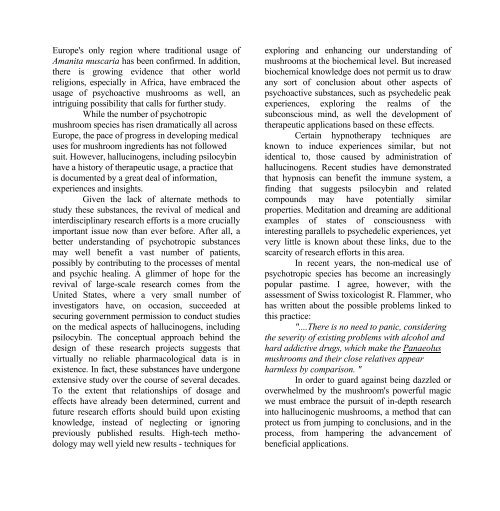Jochen Gartz - Magic Mushrooms Around the ... - preterhuman.net
Jochen Gartz - Magic Mushrooms Around the ... - preterhuman.net
Jochen Gartz - Magic Mushrooms Around the ... - preterhuman.net
Create successful ePaper yourself
Turn your PDF publications into a flip-book with our unique Google optimized e-Paper software.
Europe's only region where traditional usage of<br />
Amanita muscaria has been confirmed. In addition,<br />
<strong>the</strong>re is growing evidence that o<strong>the</strong>r world<br />
religions, especially in Africa, have embraced <strong>the</strong><br />
usage of psychoactive mushrooms as well, an<br />
intriguing possibility that calls for fur<strong>the</strong>r study.<br />
While <strong>the</strong> number of psychotropic<br />
mushroom species has risen dramatically all across<br />
Europe, <strong>the</strong> pace of progress in developing medical<br />
uses for mushroom ingredients has not followed<br />
suit. However, hallucinogens, including psilocybin<br />
have a history of <strong>the</strong>rapeutic usage, a practice that<br />
is documented by a great deal of information,<br />
experiences and insights.<br />
Given <strong>the</strong> lack of alternate methods to<br />
study <strong>the</strong>se substances, <strong>the</strong> revival of medical and<br />
interdisciplinary research efforts is a more crucially<br />
important issue now than ever before. After all, a<br />
better understanding of psychotropic substances<br />
may well benefit a vast number of patients,<br />
possibly by contributing to <strong>the</strong> processes of mental<br />
and psychic healing. A glimmer of hope for <strong>the</strong><br />
revival of large-scale research comes from <strong>the</strong><br />
United States, where a very small number of<br />
investigators have, on occasion, succeeded at<br />
securing government permission to conduct studies<br />
on <strong>the</strong> medical aspects of hallucinogens, including<br />
psilocybin. The conceptual approach behind <strong>the</strong><br />
design of <strong>the</strong>se research projects suggests that<br />
virtually no reliable pharmacological data is in<br />
existence. In fact, <strong>the</strong>se substances have undergone<br />
extensive study over <strong>the</strong> course of several decades.<br />
To <strong>the</strong> extent that relationships of dosage and<br />
effects have already been determined, current and<br />
future research efforts should build upon existing<br />
knowledge, instead of neglecting or ignoring<br />
previously published results. High-tech methodology<br />
may well yield new results - techniques for<br />
exploring and enhancing our understanding of<br />
mushrooms at <strong>the</strong> biochemical level. But increased<br />
biochemical knowledge does not permit us to draw<br />
any sort of conclusion about o<strong>the</strong>r aspects of<br />
psychoactive substances, such as psychedelic peak<br />
experiences, exploring <strong>the</strong> realms of <strong>the</strong><br />
subconscious mind, as well <strong>the</strong> development of<br />
<strong>the</strong>rapeutic applications based on <strong>the</strong>se effects.<br />
Certain hypno<strong>the</strong>rapy techniques are<br />
known to induce experiences similar, but not<br />
identical to, those caused by administration of<br />
hallucinogens. Recent studies have demonstrated<br />
that hypnosis can benefit <strong>the</strong> immune system, a<br />
finding that suggests psilocybin and related<br />
compounds may have potentially similar<br />
properties. Meditation and dreaming are additional<br />
examples of states of consciousness with<br />
interesting parallels to psychedelic experiences, yet<br />
very little is known about <strong>the</strong>se links, due to <strong>the</strong><br />
scarcity of research efforts in this area.<br />
In recent years, <strong>the</strong> non-medical use of<br />
psychotropic species has become an increasingly<br />
popular pastime. I agree, however, with <strong>the</strong><br />
assessment of Swiss toxicologist R. Flammer, who<br />
has written about <strong>the</strong> possible problems linked to<br />
this practice:<br />
"....There is no need to panic, considering<br />
<strong>the</strong> severity of existing problems with alcohol and<br />
hard addictive drugs, which make <strong>the</strong> Panaeolus<br />
mushrooms and <strong>the</strong>ir close relatives appear<br />
harmless by comparison. "<br />
In order to guard against being dazzled or<br />
overwhelmed by <strong>the</strong> mushroom's powerful magic<br />
we must embrace <strong>the</strong> pursuit of in-depth research<br />
into hallucinogenic mushrooms, a method that can<br />
protect us from jumping to conclusions, and in <strong>the</strong><br />
process, from hampering <strong>the</strong> advancement of<br />
beneficial applications.








![The Big Lie 9-11 and Government Complicity in Mass Murder [PDF]](https://img.yumpu.com/50957077/1/190x245/the-big-lie-9-11-and-government-complicity-in-mass-murder-pdf.jpg?quality=85)








